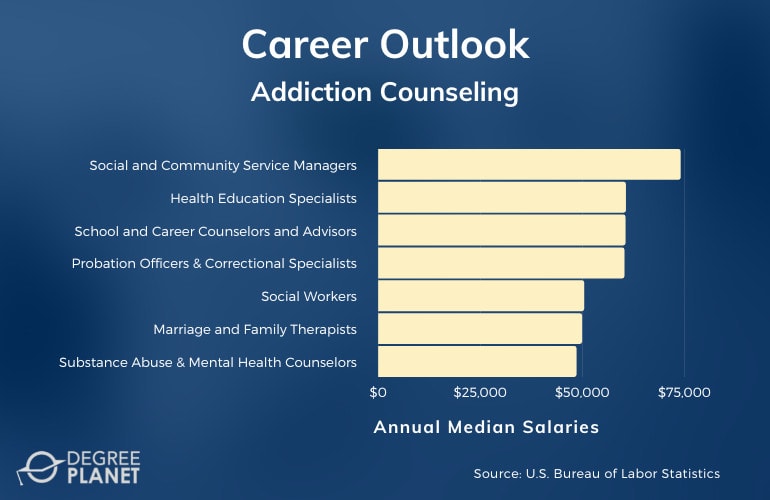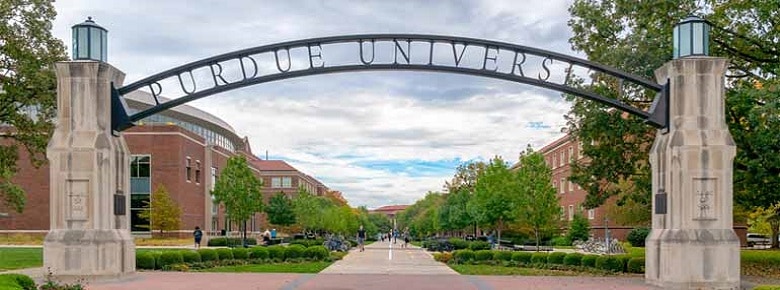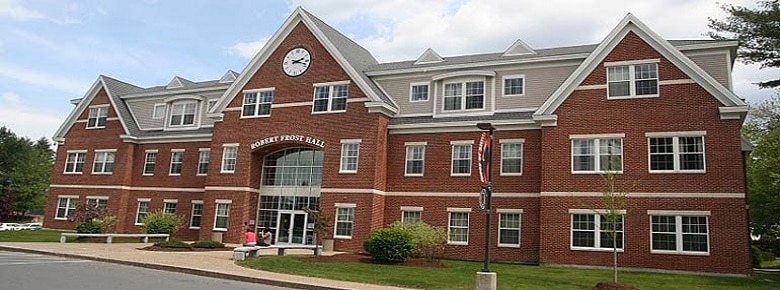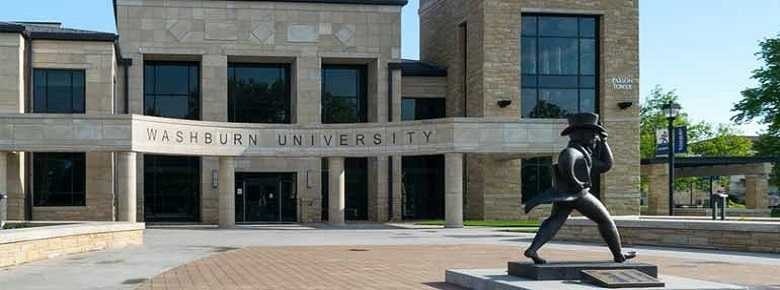An addiction counseling degree is beneficial for anyone who is interested in helping others, building interpersonal skills, and developing a strong understanding of different substance abuse disorders.

Many addiction counselors positively impact the lives of the people they work with, making it a fulfilling career choice for individuals with a passion for social work and community change.
Editorial Listing ShortCode:
Earning a bachelors in addiction counseling could be the start of your professional journey of supporting others.
Online Addiction Counseling Degrees

Addiction counselors provide mental health services for individuals struggling with drug and alcohol addiction. In addition to counseling patients, they may work closely with families, helping to educate them and provide resources.
Our modern society grapples daily with the mental and physical impacts of drug and alcohol dependency in a growing number of individuals. Earning a bachelor degree in addiction counseling may lead to a career which could not only change but save countless lives.
In a typical addiction counseling degree program, you’ll learn the basic skills and knowledge necessary to provide counseling services. Because you will be working closely with patients experiencing the impacts of various substance abuse disorders, you may also study the stages and effects of these disorders. You’ll learn about prevention and intervention techniques as well.
Your coursework may cover topics like:
- General psychology
- Ethics in addiction counseling
- Diverse populations in addiction counseling
- Juvenile justice system
- Co-occurring disorders
- Life-span development
- Chemical dependency
- Domestic violence
Alcohol and drug dependency often impact other areas of life, such as family relationships or incarceration rates. As a result, aspiring substance abuse counselors are often required to develop a strong understanding of prison and juvenile justice systems or domestic violence.
Editorial Listing ShortCode:
In addition to core counseling coursework, many addiction counseling programs require you to complete a practicum, in which you gain hands-on experience in a counseling setting. After earning a degree in substance abuse counseling, many individuals go on to become agents of change in their communities.
Many enter into a variety of social work positions, where they put their interpersonal skills and subject-specific knowledge to use. Those with a bachelor’s degree in addiction counseling often pursue the following roles:
- Health educator
- Substance abuse and behavioral disorder counselor
- Mental health counselor
Some employers prefer their counseling professionals to hold masters degrees. In addition to a degree in addiction counseling, most states require you to pass a certification and licensure exam in order to be qualified to work as a counselor. A number of universities now offer both on-campus as well as online masters in addiction counseling programs.
Each state will have its own set of licensing requirements, so it’s beneficial to check the guidelines for your state of residence.
Substance Abuse and Addiction Counseling Careers & Salaries

Most of the available careers within the field of substance abuse and drug and alcohol counseling provide the opportunity to make a positive difference in an individual’s life.
This often leads to a deep sense of fulfillment for many addiction counselors, and it can drive them to participate in a diverse range of social justice and social work organizations. While some professional positions can be pursued immediately after obtaining a degree in addiction counseling, many require you to pass a certification or licensure exam.
According to the Bureau of Labor Statistics, here are some common careers related to the study of substance abuse and addiction counseling.
| Careers | Annual Median Salaries |
| Social and Community Service Managers | $74,000 |
| Health Education Specialists | $60,600 |
| School and Career Counselors and Advisors | $60,510 |
| Probation Officers and Correctional Treatment Specialists | $60,250 |
| Social Workers | $50,390 |
| Marriage and Family Therapists | $49,880 |
| Substance Abuse, Behavioral Disorder, and Mental Health Counselors | $48,520 |
| Community Health Workers | $46,590 |
| Rehabilitation Counselors | $38,560 |
| Social and Human Service Assistants | $37,610 |
While a bachelors degree is necessary to obtain licensure and practice addiction counseling, it does not promise specific professional opportunities or salary ranges.
The jobs that you are qualified for will depend on many factors, including your geographic location, chosen industry, degree level, and previous professional experience. A number of counseling positions—such as school counselor, rehabilitation counselor, and marriage and family therapist—require a masters degree. For working professionals with a busy work schedule, a growing number of universities now offer an online masters in counseling no GRE required.
Editorial Listing ShortCode:
A bachelors in addition counseling may qualify you for entry-level positions in these sectors and for graduate studies. Some graduates plan to pursue a professional doctorate in order to become a clinical or counseling psychologist.
Addiction Counseling Bachelor’s Curriculum & Courses

During your program, you might come across courses in group counseling, assessment and diagnosis, and other related topics. Here are some examples of courses you may take:
- General Psychology: In this foundational course on the science of human behavior, you may cover topics like perception, cognition, personality theory, and biopsychology.
- Ethics in Addiction Counseling: This course introduces you to key policies and ethical and legal standards in addiction counseling, exploring specific laws and ethical codes used to influence decision-making.
- Diverse Populations in Addiction Counseling: You’ll study the client-counselor relationship across a variety of diverse perspectives, taking into account best practices in cross-cultural addiction counseling.
- Juvenile Justice System: In this course, you’ll learn the basics of the juvenile justice system, including the history of the court system and its connection to and role in addiction and rehabilitation.
- Co-Occurring Disorders: Assessment and Treatment: This course introduces you to tools and techniques for the recognition, diagnosis, and treatment of co-occurring substance abuse disorders.
- Life-Span Development: Using theories and methods from developmental psychology, this course will explore human development from birth until death.
- Chemical Dependency: In this course, you’ll learn key theories and histories related to chemical dependency, and you’ll also study methods of prevention, intervention, and treatment.
- Domestic Violence: An introduction to the ways in which domestic violence impacts individuals and families, this course covers topics like recognizing signs of domestic abuse, legal issues, and stopping domestic violence cycles.
- Introduction to Social Work: You’ll study best practices for aiding marginalized or oppressed communities, and you’ll learn about the different kinds of social work programs as well as the human problems that led to their creation.
- Basic Pharmacology: This course is on the fundamentals of pharmacology, so you may cover areas such as the nervous system, clinical trials, drug therapies, and prescription medications, all through the lens of substance abuse.
Most programs also require you to complete a capstone project.
How to Become an Addiction Counselor

While earning your bachelor’s degree can be a first step toward becoming an addiction counselor, more qualifications are needed to become a certified counselor.
Here are the common steps to becoming a substance abuse or addiction counselor:
- Earn your degree. At the very minimum, it’s necessary to complete a bachelor’s degree if you would like to enter into counseling. Many individuals also choose to earn their master’s degree, as it can help you qualify for specific counselor and therapist positions.
- Pursue licensure. Becoming licensed includes completing clinical hours and passing an exam. Requirements for licensure will vary by state, so it’s helpful to check the specific guidelines for your state of residence.
- Gain professional experience. Gaining experience in the field is key. You can acquire experience through a practicum or as part of an existing addiction counseling program.
Becoming an addiction counselor is not a process that can, or should, be rushed. Because you will be seeing clients and individuals who are experiencing various addiction and substance abuse disorders, it’s beneficial to learn how to build trusting relationships.
You can often practice developing client trust through any internship and practicum experiences required in a bachelor’s or master’s degree program.
Admissions Requirements

Although every college and university has unique admissions criteria, applications typically include some similar items. These items are intended to provide an understanding of your character, academic strengths, and long-term goals.
Along with an application fee, most schools require you to submit:
- SAT or ACT scores (only some schools require them)
- Official transcripts
- Personal statement
- Letters of recommendation
You may also be required to include any extracurricular experiences. In an application for an addiction counseling program, your extracurriculars and volunteer work could demonstrate your passion for helping others and help you stand out as a candidate.
Accreditation

As you search for addiction counseling degree programs, it is beneficial to verify that prospective schools hold regional accreditation.
If a school or a program is accredited, it means that it has passed a thorough evaluation for quality by an outside accrediting agency. As a result, degrees that are earned at accredited schools are recognized as credible by other institutions and future employers.
Editorial Listing ShortCode:
In addition to a valid degree, accreditation ensures that you have the opportunity to apply for federal financial aid. Federal aid is not granted to students who attend an unaccredited college or university.
Addiction Counseling Licensure and Certifications

After earning your bachelors degree in addiction counseling, you can pursue licensure to become a certified counselor. Every state has unique licensing requirements and processes. In addition to a state license, you can choose to earn professional certifications that can help qualify you for specific counseling positions.
Potential certifications include:
- Certified Substance Abuse Practitioner: Geared toward licensed healthcare workers, this certification requires a bachelor’s degree and the completion of a 250-hour training.
- Certified Addiction Specialist: This clinical certification is available in several areas, such as drug and alcohol addiction, and it requires an undergraduate degree and 270 hours of training and education.
- National Certified Addiction Counselor, Level ll: Requirements for this certification include 5 years of counseling experience, a valid state license, and documented HIV and AIDS training.
Your career aspirations, academic background, and professional experience can help determine which certification is right for you.
Financial Aid and Scholarships

Many individuals and families seek out financial aid or scholarship opportunities to help them tackle the costs of attending college. Fortunately, financial aid comes in many different forms and is available to a wide range of qualifying students.
If you would like to determine how much federal financial aid you can receive, you can complete the Free Application for Federal Student Aid (FAFSA). This application examines eligibility criteria, such as family income level and academic enrollment status. Student loans, grants, and work-study programs are common forms of federal aid.
Scholarship opportunities are typically offered by schools and public or private organizations. You are often required to complete an application to be considered.
Do You Need a Degree to Be a Substance Abuse Counselor?

There are unique requirements for becoming a substance abuse counselor in each state. Most states, though, require an undergraduate degree or a specified amount of education to be eligible for an official license.
A bachelor’s degree program in substance abuse counseling can provide you with necessary background knowledge and tools to be effective in the field. In addition to core courses, such as abnormal psychology and methods of counseling, you will also complete a practicum. This is an opportunity for you to put your skills to work in a counseling setting and receive guidance and feedback from a mentor or supervisor.
What Qualifications Do You Need to Be an Addiction Counselor?
In order to become an addiction counselor, it’s necessary to meet certain qualification standards in education, licensing, and certification.
Here are common qualifications:
- Bachelor’s degree. Most states require at least a bachelor’s degree in order to qualify for an addiction counseling license. Those who want to work in private practice typically need a masters.
- State license. Licensure requirements vary from state to state, especially depending on whether you’re practicing in or outside of private practice. Most states require candidates to pass an exam, and a number of states also require supervised clinical experience.
- Industry certifications. These can be obtained for work in specific fields, such as adolescent substance abuse.
Strong interpersonal skills and an ability to empathize with others are also beneficial traits in this line of work.
What Can You Do with a Bachelor’s Degree in Addiction Counseling?

A degree in addiction counseling, sometimes referred to as substance abuse counseling, often leads to a career helping others. Many people who earn their degree in addiction counseling go on to become substance abuse or mental health counselors, working with individuals of all ages.
Editorial Listing ShortCode:
Graduates may also find positions working as health educators. Others may pursue further education and use their communication and relationship-building skills to fill roles as school counselors or career advisors. Counseling professionals with experience may qualify for leadership opportunities, such as social or community service managers.
How Long Does It Take to Become an Addiction Counselor?

The traditional route to becoming an addiction counselor begins with completing a bachelor’s degree, a process which typically takes 4 years with full-time study.
After earning an undergraduate degree in substance abuse counseling, it’s necessary to obtain a state license or certification. Depending on your state, you might be required to complete a certain number of clinical hours. Finally, it’s necessary to pass a licensing exam.
Completing a bachelor’s degree and the required clinical hours generally takes about 6 years. Licensing requirements can vary from state to state, though. There are some schools that offer accelerated programs, making it possible to become licensed in less time.
Is an Online Addiction Counseling Degree Worth It?

Yes, an online addiction counseling degree is worth it for many professionals. Becoming an addiction counselor enables you to make a positive impact in an individual’s life. There are people of all ages struggling with substance abuse who need empathetic and reliable counselors to turn to.
Editorial Listing ShortCode:
Additionally, we live in a society that places increasing value on counselors and mental health professionals. For example, the Bureau of Labor Statistics projects 23% job growth for substance abuse, behavioral disorder, and mental health counselors over the next ten years. This growth rate is much faster than the average for all occupations.
Universities Offering Online Bachelors in Addiction Counseling Degree Program
Methodology: The following school list is in alphabetical order. To be included, a college or university must be regionally accredited and offer degree programs online or in a hybrid format.

Alvernia University offers a Bachelor of Arts in Addictions and Mental Health Treatment. This program leads to CADC certification. Courses are 7 weeks long and include Foundations of Chemical Dependency, Counseling Theories, Legal and Ethical Issues in Counseling, and more. The program also requires students to complete 400 hours of fieldwork.
Alvernia University is accredited by the Middle States Commission on Higher Education.

Bay Path University offers a BA in Psychology – Foundations in Alcohol and Drug Abuse Counseling. Course options include Counseling Diverse Populations, Addictions and Intervention, Individual and Family Treatment of Substance Abuse Disorders, and more. The program also requires the completion of an internship that is 300 hours long.
Bay Path University is accredited by the New England Commission of Higher Education.

Brescia University offers a Bachelor of Science in Addictions Counseling. The program is available online and may be taken part-time or full-time. Coursework includes Case Management and Documentation, Crisis and Brief Interventions Counseling, Theories and Addiction, Addictions and the Family, and more.
Brescia University is accredited by the Southern Association of Colleges and Schools Commission on Colleges.

Clarks Summit University offers an online program for a Bachelor of Science in Addictions Counseling. Clarks Summit provides small class sizes and teaches a biblical worldview. Online classes are 8 weeks long and have no set meeting times. There are at least five start dates every year.
Clarks Summit University is accredited by the Middle States Commission on Higher Education.

Grand Canyon University offers a Bachelor of Science in Counseling with an emphasis in Addiction, Chemical Dependency, and Substance Abuse. The degree is available both online and on campus. Online classes are 7 weeks long, and on-campus classes are 15 weeks long. GCU teaches a Christian worldview and how to incorporate spirituality into counseling.
Grand Canyon University is accredited by the Higher Learning Commission.

Indiana Wesleyan University offers a Bachelor of Science in Addictions Counseling. This Christian program is mostly online but does include an in-person practicum that can be completed at a convenient site. Coursework includes Psychopharmacology, Addictions Counseling Skills, Psychology of Abnormal Behavior, and more.
Indiana Wesleyan University is accredited by the Higher Learning Commission.

Midwestern State University’s Bachelor of Science in Substance Abuse Counseling can help prepare students for Chemical Dependency Licensure. The degree can be earned in a fully online, flexible format. Courses options include Pharmacology of Substance Abuse, Adolescents and Substance Abuse, Family Dynamics, Substance Abuse and Diversity, and more.
Midwestern State University is accredited by the Southern Association of Colleges and Schools Commission on Colleges.

Ottawa University offers a Bachelor of Science in Addiction Counseling. The degree is available online and at three different campus locations. Courses are offered in accelerated 8 week sessions. The curriculum emphasizes cultural competence and the understanding of diverse communities. Students in the program must complete a 300 hour internship, including time spent working directly with clients.
Ottawa University is accredited by The Higher Learning Commission.

Ottawa University offers a Bachelor of Science in Addiction Counseling. The degree is available online and at three different campus locations. Courses are offered in accelerated 8 week sessions. The curriculum emphasizes cultural competence and the understanding of diverse communities. Students in the program must complete a 300 hour internship, including time spent working directly with clients.
Purdue University is accredited by The Higher Learning Commission of the North Central Association of Colleges and Schools.

Southern New Hampshire University offers an online program for a Bachelor of Arts in Psychology with a concentration in Addictions. There are no set class meeting times, and coursework can be accessed at any time. Course options include Foundations of Addictions, Contemporary Issues in Addictions, Biopsychology, and more.
Southern New Hampshire University is accredited by the New England Commission of Higher Education.

The University of Central Arkansas offers a Bachelor of Science in Addiction Studies – Treatment. The full degree program is available on campus, and there is also an online degree completion option for students who have already earned associate degrees. Graduates often pursue employment in outpatient clinics, hospitals, schools, and similar settings.
The University of Central Arkansas is accredited by the Higher Learning Commission.

The University of Cincinnati’s Bachelor of Science in Substance Abuse Counseling program is designed to meet academic requirements for licensure. The degree can be earned 100% online, and classes can be taken full-time or part-time. Course options include Historical Perspectives in Substance Abuse Counseling, Basic Pharmacology, and Foundations of Cultural Competence.
The University of Cincinnati is accredited by the Higher Learning Commission.

The University of Mary offers an online program for a Bachelor of Science in Addiction Counseling. Graduates are eligible to apply for licensure in the state of North Dakota. The curriculum provides studies in the code of Professional Ethics and Responsibilities and how to assess client needs and develop treatment plans.
The University of Mary is accredited by the Higher Learning Commission of the North Central Association of Colleges and Schools.

The University of South Dakota offers a BS in Addiction Counseling and Prevention. The degree program is available both on campus and online. USD’s students are required to participate in internships to gain real-world experience, and previous graduating classes have had 100% pass rates on licensure exams.
The University of South Dakota is accredited by the Higher Learning Commission.

Washburn University offers a Bachelor of Applied Science in Family and Human Services – Addiction Counseling. The degree can be earned on campus, online, or in a hybrid format. The program aims to help students become Licensed Addiction Counselors in the state of Kansas. Before graduating, students must complete two, 200 hour internships.
Washburn University is accredited by the Higher Learning Commission.
Getting Your Bachelor’s in Addiction Counseling Degree Online

Earning an addiction counseling degree online is often the first step toward becoming a licensed and certified addiction counselor.
Your degree program can teach you the knowledge and tools necessary for effective counseling. This can include how to assess and diagnose substance abuse disorders and how to discern ethical issues in the field. In addition to practical tools, you can also learn how to build trust and rapport with clients, an integral part of the job.
If you’re interested in this growing field, you can start exploring online addiction counseling degree programs from accredited schools today.

